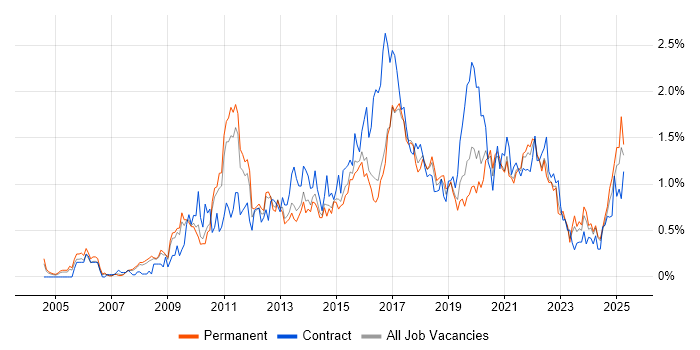BI Developer
West Midlands > Birmingham
The median BI Developer salary in Birmingham is £46,250 per year, according to job vacancies posted during the 6 months leading to 16 May 2025.
The table below provides salary benchmarking and summary statistics, comparing them to the same period in the previous two years.
| 6 months to 16 May 2025 |
Same period 2024 | Same period 2023 | |
|---|---|---|---|
| Rank | 81 | 132 | 120 |
| Rank change year-on-year | +51 | -12 | +29 |
| Permanent jobs requiring a Business Intelligence Developer | 22 | 18 | 15 |
| As % of all permanent jobs advertised in Birmingham | 1.57% | 0.65% | 0.78% |
| As % of the Job Titles category | 1.66% | 0.69% | 0.84% |
| Number of salaries quoted | 22 | 17 | 11 |
| 10th Percentile | - | £42,500 | £44,186 |
| 25th Percentile | £44,000 | £45,026 | £44,625 |
| Median annual salary (50th Percentile) | £46,250 | £51,000 | £47,500 |
| Median % change year-on-year | -9.31% | +7.37% | -6.17% |
| 75th Percentile | £65,000 | £62,500 | £50,000 |
| 90th Percentile | £68,750 | £65,500 | £51,787 |
| West Midlands median annual salary | £45,000 | £51,000 | £47,500 |
| % change year-on-year | -11.76% | +7.37% | - |
All Permanent IT Job Vacancies
Birmingham
For comparison with the information above, the following table provides summary statistics for all permanent IT job vacancies in Birmingham. Most job vacancies include a discernible job title that can be normalized. As such, the figures in the second row provide an indication of the number of permanent jobs in our overall sample.
| Permanent vacancies in Birmingham with a recognized job title | 1,326 | 2,606 | 1,783 |
| % of permanent jobs with a recognized job title | 94.71% | 94.39% | 93.20% |
| Number of salaries quoted | 775 | 2,118 | 1,363 |
| 10th Percentile | £32,500 | £31,250 | £31,250 |
| 25th Percentile | £42,500 | £41,000 | £42,500 |
| Median annual salary (50th Percentile) | £55,000 | £55,000 | £55,000 |
| 75th Percentile | £68,750 | £70,000 | £71,250 |
| 90th Percentile | £83,750 | £84,964 | £81,450 |
| West Midlands median annual salary | £52,500 | £50,000 | £52,500 |
| % change year-on-year | +5.00% | -4.76% | +5.00% |
Business Intelligence Developer
Job Vacancy Trend in Birmingham
Job postings that featured Business Intelligence Developer in the job title as a proportion of all IT jobs advertised in Birmingham.

Business Intelligence Developer
Salary Trend in Birmingham
3-month moving average salary quoted in jobs citing Business Intelligence Developer in Birmingham.
Business Intelligence Developer
Salary Histogram in Birmingham
Salary distribution for jobs citing Business Intelligence Developer in Birmingham over the 6 months to 16 May 2025.
Business Intelligence Developer Skill Set
Top 30 Co-occurring Skills and Capabilities in Birmingham
For the 6 months to 16 May 2025, Business Intelligence Developer job roles required the following skills and capabilities in order of popularity. The figures indicate the absolute number co-occurrences and as a proportion of all permanent job ads across the Birmingham region featuring Business Intelligence Developer in the job title.
|
|
Business Intelligence Developer Skill Set
Co-occurring Skills and Capabilities in Birmingham by Category
The follow tables expand on the table above by listing co-occurrences grouped by category. The same employment type, locality and period is covered with up to 20 co-occurrences shown in each of the following categories:
